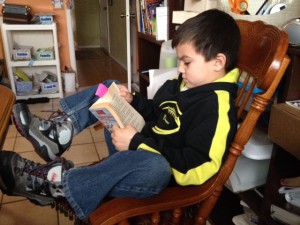It would be pointless to temper my feelings about literacy for you. After teaching hundreds of children to read in the first grade classroom, I am a firm advocate of literacy and believe that literacy is critical to a child’s happiness and success.
By definition, literacy is the ability to read and write. As reading is the primary source of gathering information and writing is the primary tool of communicating with others, the significance of literacy cannot be overstated. I am aware of the irony of preaching my thoughts regarding literacy in writing to be read exclusively by the choir. Regardless, Literacy Really Does Matter.
I was certainly fortunate. My father was an educator and my mother read countless books to us (my siblings and I) when we were very young. I “picked up” reading quite easily (evidence that a home steeped in language is powerful) and was reading when I started kindergarten. I enjoyed reading and became a very fluent reader as practice is certainly one variable in reading proficiency.
As an educator, I was able to contrast my early childhood with that of students I served. Many came from families with parents who had poor literacy skills. I witnessed first-hand a vicious cycle of poor parental literacy which too often translated into literacy frustration for my first graders.
I found the following facts (gleaned from the resources cited below) to be interesting.
There are certainly economic impacts of poor literacy for adults. Data indicates that adults are more likely to be non-working and are more likely to be on state benefits if they have significant difficulty reading and writing. Poverty and poor living conditions often accompany poor literacy, one is less likely to own a home, and wages earned by the illiterate are often no more than minimum wage.
Health concerns abound for the functionally illiterate. Adults with significantly poor literacy skills are more likely to smoke and drink excessively and often require more medical and mental health care than their literate counterparts. There is higher infant mortality in illiterate families and a shorter life expectancy.
Socially, adults with poor literacy are more likely to live solitary lives than their more literate peers. They are less likely to vote or participate in the community. They are less likely to trust people and are more likely to become incarcerated. According to the Department of Justice, “The link between academic failure and delinquency, violence, and crime is welded to reading failure.” In fact, studies indicate that up to 80% of incarcerated adults are functionally illiterate while a child who is reading on grade level in 3rd grade has a 99% certainty of never being in jail.
Home life is certainly affected. Couples who are functionally illiterate are more likely to divorce than couples with strong literacy skills. Children from homes with illiterate parents are more likely to have extreme school absenteeism. They are often ill-prepared to start school and quickly become further and further behind. They are more likely to drop out of school, have children of their own at a young age, and are likely to have poor literacy skills themselves.
While literacy rates in the United States are higher than rates in many countries around the world, 14% of the adult population can’t read (32 million adults) and 21% read below a 5th grade level according to a study conducted in late April by the U.S. Department of Education and the National Institute of Literacy. This information begs a couple of questions: why should I care about the literacy of others and what can I do about it? I’d love to hear your ideas! Join the conversation by replying with the button at the top of this post.
To Read or Not to Read (2007), The National Literacy Trust (England), Literacy and Primary Education (Chowdhury), Education for All Global Monitoring Report (2006), Reading Horizons (Angela Stevens)
Before you leave the site, follow my blog (top, right of this post). It’s quick and easy 🙂
For more from Marea, check out Me and Thee Studios’ faith based leveled readers for 1st-2nd graders at http://www.meandtheestudios.com/early-reader-collection.html.

